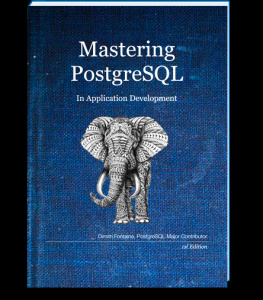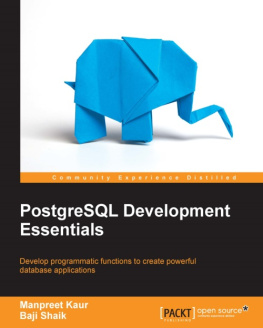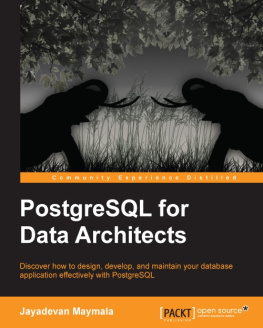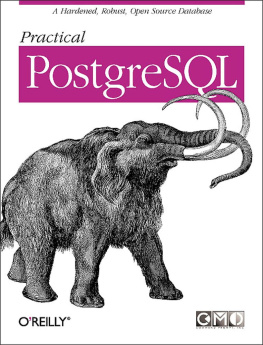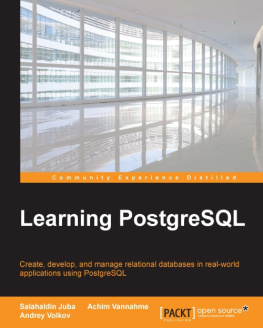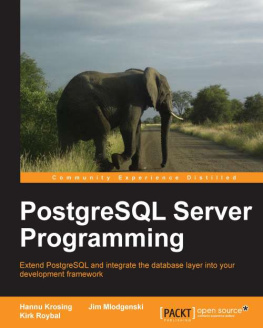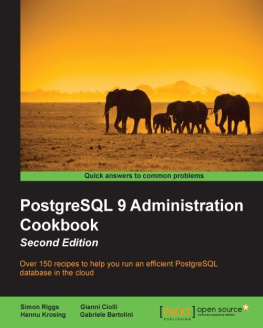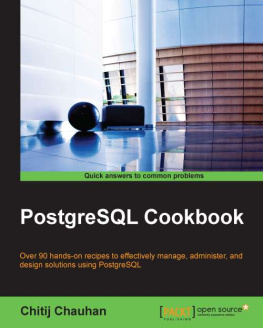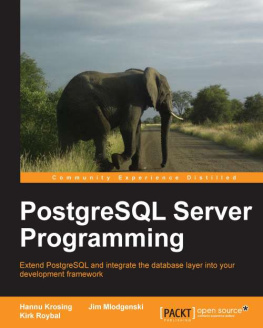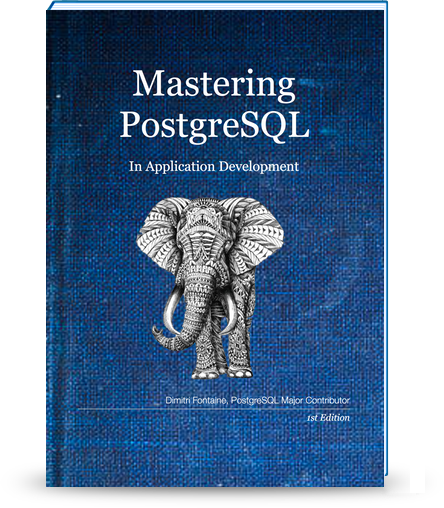After all, a developers job encompasses more than just writing code. Our job is to produce results, and for that we have many tools at our disposal. SQL is one of them, and this book teaches you all about it.
PostgreSQL is used to manage data in a centralized fashion, and SQL is used to get exactly the result set needed from the application code. An SQL result set is generally used to fill in-memory data structures so that the application can then process the data. So, let's open this book with a quote about data structures and application code:
1.1 About the Book
This book is intended for developers working on applications that use a database server. The book specifically addresses the PostgreSQL RDBMS: it actually is the world's most advanced Open Source database, just like it says in the tagline on the official website. By the end of this book youll know why, and youll agree!
I wanted to write this book after having worked with many customers who were making use of only a fraction of what SQL and PostgreSQL are capable of delivering. In most cases, developers I met with didn't know whats possible to achieve in SQL. As soon as they realized or more exactly, as soon as they were shown what's possible to achieve , replacing hundreds of lines of application code with a small and efficient SQL query, then in some cases they would nonetheless not know how to integrate a raw SQL query in their code base.
To integrate a SQL query and think about SQL as code, we need to solve what is already solved when using other programming languages: versioning, automated testing, code reviewing, and deployment. Really, this is more about the developer's workflow than the SQL code itself
In this book, you will learn best practices that help with integrating SQL into your own workflow, and through the many examples provided, youll see all the reasons why you might be interested in doing more in SQL. Primarily, it means writing fewer lines of code. As Dijkstra said, we should count lines of code as lines spent, so by learning how to use SQL you will be able to spend less to write the same application!
The practice is pervaded by the reassuring illusion that programs are just devices like any others, the only difference admitted being that their manufacture might require a new type of craftsmen, viz. programmers. From there it is only a small step to measuring programmer productivity in terms of number of lines of code produced per month. This is a very costly measuring unit because it encourages the writing of insipid code, but today I am less interested in how foolish a unit it is from even a pure business point of view. My point today is that, if we wish to count lines of code, we should not regard them as "lines produced" but as lines spent: the current conventional wisdom is so foolish as to book that count on the wrong side of the ledger.
On the cruelty of really teaching computing science, Edsger Wybe Dijkstra, EWD1036
1.2 About the Author
Dimitri Fontaine is a PostgreSQL Major Contributor, and has been using and contributing to Open Source Software for the better part of the last twenty years. Dimitri is also the author of the pgloader data loading utility, with fully automated support for database migration from MySQL to PostgreSQL, or from SQLite, or MS SQLand more.
Dimitri has taken on roles such as developer, maintainer, packager, release manager, software architect, database architect, and database administrator at different points in his career. In the same period of time, Dimitri also started several companies (which are still thriving) with a strong Open Source business model, and he has held management positions as well, including working at the executive level in large companies.
Dimitri runs a blog at http://tapoueh.org with in-depth articles showing advanced use cases for SQL and PostgreSQL.
1.3 Acknowledgements
First of all, I'd like to thank all the contributors to the book. I know they all had other priorities in life, yet they found enough time to contribute and help make this book as good as I could ever hope for, maybe even better!
I'd like to give special thanks to my friend Julien Danjou who's acted as a mentor over the course of writing of the book. His advice about every part of the process has been of great value maybe the one piece of advice that I most took to the heart has been write the book you wanted to read.
Id also like to extend my thanks to the people interviewed for this book. In order of appearance, they are Yohann Gabory from the French book Django Avanc, Markus Winand from http://use-the-index-luke.com and http://modern-sql.com, Grgoire Hubert author of the PHP POMM project, lvaro Hernndez Tortosa who created ToroDB, bringing MongoDB to SQL, and Kris Jenkins, functional programmer and author of the YeSQL library for Clojure.
Having insights from SQL users from many different backgrounds has been valuable in achieving one of the major goals of this book: encouraging you, valued readers, to extend your thinking to new horizons. Of course, the horizons Im referring to include SQL.
I also want to warmly thank the PostgreSQL community. If you've ever joined a PostgreSQL community conference, or even asked questions on the mailing list, you know these people are both incredibly smart and extremely friendly. Its no wonder that PostgreSQL is such a great product as it's produced by an excellent group of well-meaning people who are highly skilled and deeply motivated to solve actual users problems.
Finally, thank you dear reader for having picked this book to read. I hope that youll have a good time as you read through the many pages, and that you'll learn a lot along the way!
Introduction
SQL stands for Structured Query Language; the term defines a declarative programming language. As a user, we declare the result we want to obtain in terms of a data processing pipeline that is executed against a known database model and a dataset.
The database model has to be statically declared so that we know the type of every bit of data involved at the time the query is carried out. A query result set defines a relation, of a type determined or inferred when parsing the query.
When working with SQL, as a developer we relatedly work with a type system and a kind of relational algebra. We write code to retrieve and process the data we are interested into, in the specific way we need.
RDBMS and SQL are forcing developers to think in terms of data structure, and to declare both the data structure and the data set we want to obtain via our queries.
Some might then say that SQL forces us to be good developers:

